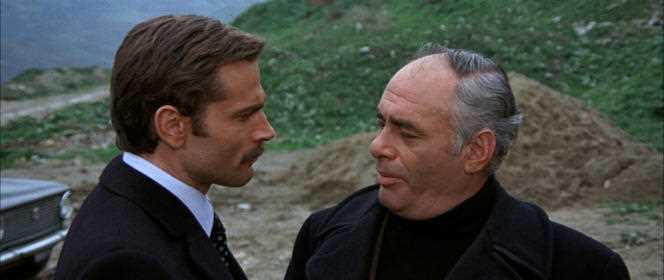Damiano Damiani (1922-2013) is a figure of Italian cinema little known in France, perhaps because of a status that remained undecided between auteur cinema and commercial cinema. First a documentary filmmaker, he turned to fiction from 1969 and produced around thirty feature films, including Confessions of a police commissioner to the public prosecutor, made in 1971, is one of the most famous. It was the time when this Friuli native, like any self-respecting Italian director, confronted Sicily, to shoot particularly sharp mafia films there, in the Italy of the leaden years.
This one is remarkably radical. Two men oppose it in a merciless struggle, yet both embody the arm of justice, a police commissioner and a judge. The first, Commissioner Bonavia – played by American actor Martin Balsam (On the docks, Twelve angry men, Psychosis) – despairs of ever being able to corner Ferdinando Lomunno, a mafioso who poses as a real estate developer, and whose political connivance makes him untouchable. The second, played by Italian star Franco Nero, is Judge Traini, a young and elegant magistrate from the North, apparently of Jewish faith, honest but blinded by his legalism, unable to see the degree of corruption of the institution that he serves.
Political and moral confrontation
Their paths cross when the old veteran of the criminal, revolted by the cynicism and impunity of the monster Lomunno – child killer and killer of all life – decides to release from the asylum a dangerous psychopath, who has an old account to settle with the mafia. Warned by a cop in his pay, the latter escapes, once again, the attack programmed behind the scenes by Bonavia. Appointed on the case, the judge does not take long to suspect the commissioner. The confrontation between the two men, both political and moral, proves to be exemplary of the aporia shaped by this film, between a legalism that allows crime to prosper and an illegalism that takes the risk of competing with it.
With its corpses carefully cast in the cement of the buildings built by the mafia, this film nails to the pillory with uncommon efficiency the corruption and filth of a system where capitalism and organized crime reciprocally protect each other by virtue of a value that brings them together: profit. His knowledge of physiognomy (everyone has the mouth of his job), his dry nervousness of series B, his brief visions of horror help a lot. And make them extremely curious about a work that we will be able to discover in its entirety, between May 11 and 29, at the French Cinematheque.
You have 6.05% of this article left to read. The following is for subscribers only.
